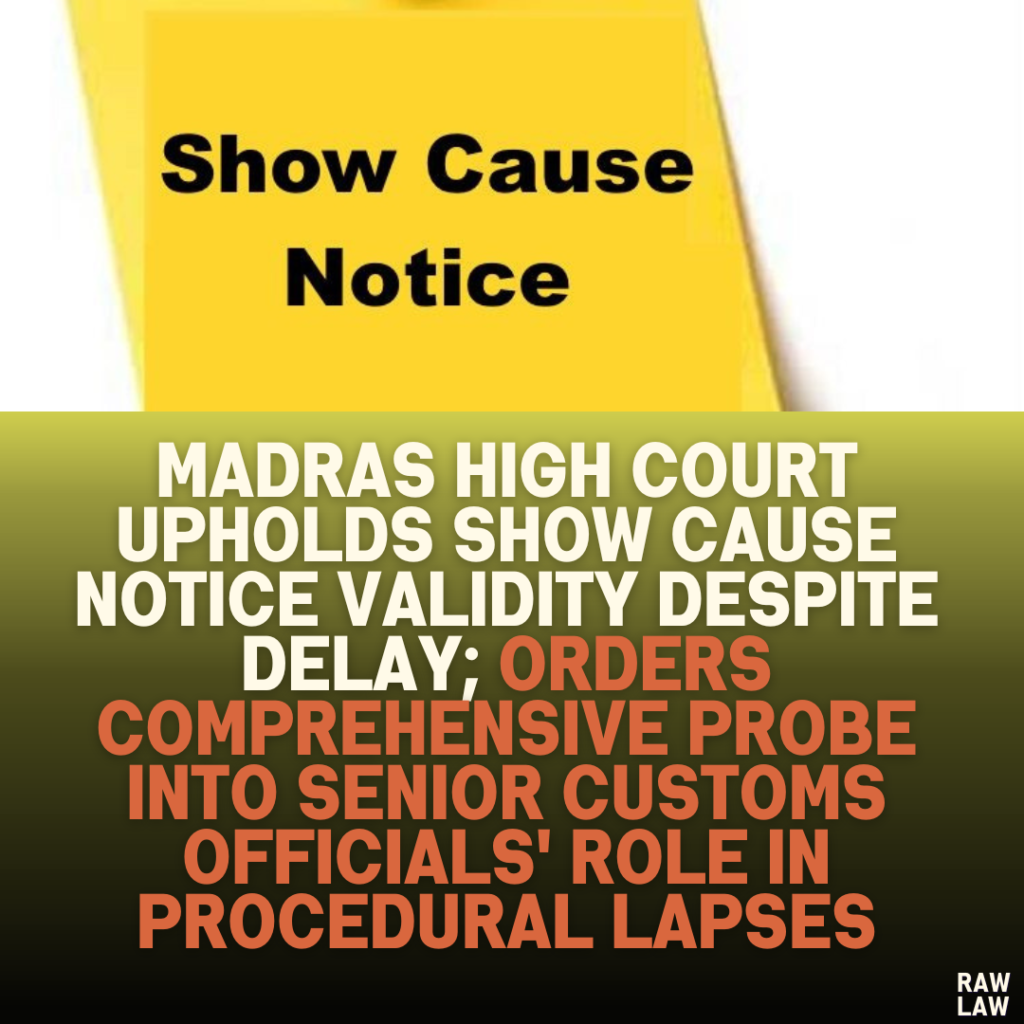Court’s Decision: The Madras High Court dismissed the writ appeal filed by the appellant, affirming the dismissal of the writ petition against the customs department’s show cause notice (SCN) issued under Section 28(4) of the Customs Act, 1962. The appellant challenged the SCN on the grounds of being time-barred. However, the court ruled that due to an extension granted by the Chief Commissioner of Customs under Section 28(9), the SCN remained valid. The court also directed an investigation into delays in adjudication and ordered disciplinary proceedings against responsible officers.
Facts: The appellant received an SCN dated 28.09.2022, issued by the Commissioner of Customs, concerning alleged customs duty violations. The appellant argued that the SCN was barred by limitation as per Section 28(9) of the Customs Act, claiming that the statutory time frame had expired by 27.09.2023. In response, the customs department argued that an extension had been granted under the first proviso to Section 28(9) by the Chief Commissioner of Customs on 07.05.2024, thus keeping the SCN alive until 27.09.2024.
Issues:
- Whether the SCN issued to the appellant could be adjudicated beyond the statutory time limit prescribed in Section 28(9) of the Customs Act.
- Whether the delay in adjudication by customs officials warranted disciplinary action.
Petitioner’s Arguments: The appellant argued that the SCN was void as it was issued beyond the limitation period under Section 28(9) of the Customs Act. The appellant highlighted that the customs department failed to adhere to statutory timelines and contended that proceedings should be deemed concluded per the second proviso to Section 28(9).
Respondent’s Arguments: The customs department maintained that the limitation period was validly extended by the Chief Commissioner of Customs under Section 28(9) of the Customs Act, allowing the adjudication to proceed. It was further argued that the appellant’s engagement in cross-examination supported the ongoing process’s validity.
Analysis of the Law: Under Section 28(9) of the Customs Act, an SCN must be adjudicated within six months or one year, depending on the nature of the case. The first proviso allows a senior officer to extend this period under specific circumstances. The second proviso stipulates that if adjudication does not occur within the extended period, the proceedings are deemed concluded as if no notice had been issued. Here, the court noted the extension was validly granted, thereby sustaining the SCN.
Precedent Analysis: The court referenced the Supreme Court rulings in Andaman Timber Industries v. Commissioner of Central Excise and Kanungo & Co. v. Collector of Customs, which uphold the necessity of adhering to procedural timelines and cross-examination rights. The court distinguished this case by emphasizing the Chief Commissioner’s authorized extension.
Court’s Reasoning: The court observed that while the SCN could have lapsed without timely adjudication, the Chief Commissioner’s extension preserved its validity. The court expressed concern over procedural lapses and delays by customs officials, noting a pattern of non-compliance potentially undermining revenue interests. The court found that mere disciplinary action against two junior officers was insufficient and called for an inquiry into the involvement of senior officials.
Conclusion: The court dismissed the appeal, upholding the validity of the SCN due to the Chief Commissioner’s timely extension under Section 28(9). The court emphasized the need for adherence to procedural safeguards and directed that disciplinary proceedings be expanded to address potential complicity among senior customs officials.
Implications: This ruling reinforces the importance of procedural timelines in customs adjudication and the accountability of customs officials in handling SCNs. The decision underscores that disciplinary action should extend beyond junior officials to include senior officers if complicity in procedural lapses is evident, signaling the court’s firm stance on maintaining the integrity of customs enforcement processes.




Pingback: Delhi High Court Appoints Arbitrator in Fire-Fighting Contract Dispute, Allows Limitation Argument Before Arbitrator But Holds Claim ‘Not Ex Facie Time-Barred - Raw Law
Pingback: Delhi High Court Affirms NHAI Capital Grant Subsidy to BOT Concessionaires Not Liable for TDS Under Section 194C – Upholds Tribunal’s Ruling on Principal-to-Principal Relationship and Viability Gap Funding - Raw Law